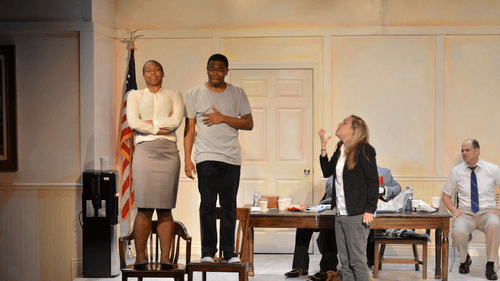Stay in the Loop
BSR publishes on a weekly schedule, with an email newsletter every Wednesday and Thursday morning. There’s no paywall, and subscribing is always free.
Stop, collaborate, and listen
Philadelphia Scenic Works builds a future together

Ten years ago, to kick off InterAct Theatre Company’s 20th anniversary season, I brought together five area thought leaders: Michael Nutter, then the Democratic nominee for mayor; psychiatrist Dr. Salman Akhtar; Mural Arts Program executive director Jane Golden; then-editor-in-chief of the Philadelphia Inquirer, William Marimow; and then-president of the Philadelphia Foundation, Andrew Swinney. We hosted an evening called “The Next 20 Years” to provoke discussion around pressing issues facing Philadelphia, the United States, and the world.
As you might imagine, the conversation covered a wide range of topics. We touched on the rise in fundamentalism and violent crime, the need for greater community engagement, and the ways our professional and personal lives are changing as a result of advances in technology and social media. But for me, the most provocative moment was Swinney’s assertion that the continued proliferation of nonprofit organizations is dangerously unsustainable.
Divided we fall
From his bird’s-eye view atop a major foundation, Swinney asserted that individual and institutional funding could keep up with the ballooning demand from nonprofits across the Philadelphia region and the country. He suggested that nonprofit organizations should become more creative in their institutional thinking and consider the possibilities of greater collaboration — partnering and even merging — or risk successive waves of upheaval in which many organizations would cease altogether.
Most nonprofit arts organizations have the mindset of doing everything on their own. They want to remain fiercely independent, out of a (sometimes misguided) instinct to not compromise their identities. In my experience as InterAct’s founder and artistic director, this mindset can lead to unhealthy decisions and fragile business models.
I have always valued collaboration, and have embraced many different kinds of partnerships. I’ve worked with sister theaters around the country to found the National New Play Network. I’ve coproduced, locally, with Act II Playhouse, Mural Arts, Asian Arts Initiative, and Philadelphia Young Playwrights, as well as nationally, with 59E59, New Georges and Actors’ Theatre of Louisville’s Humana Festival for New American Plays.
More recently, I envisioned the Drake as a regional center for new plays, as a home not only to InterAct but also four other resident theater partners: Playpenn, Azuka, Inis Nua, and Simpatico. These partnerships have achieved different goals, including sharing expenses, leveraging greater earned and/or contributed revenue, broadening audiences, maximizing community impact, and developing more efficient systems.
Built to last
For the past 18 months, I have been part of a new collaborative effort, an organization addressing an ongoing challenge in our professional theater community: how can we generate high-quality, safely constructed scenery for theaters large and small, at a reasonable cost?

With the exception of a few of our larger theaters that have in-house scene shops, most of the region’s other 30 to 40 companies hire individual carpenters (at lower cost, but often with questionable safety and quality) or outside for-profit scene shops (at high cost) to build their sets. A group of leaders from InterAct, Theatre Horizon, Act II Playhouse, Philadelphia Theatre Company, and Pig Iron Theatre, along with local scenic designers and members of IATSE (the International Association of Theatrical Stage Employees) Local 8, organized to establish Philadelphia Scenic Works (PSW).
We repurposed an existing 501c3 from the defunct Off-Broad Street Theatre and opened our new, nonprofit, full-service scene shop at the nexus of North Philadelphia’s Kensington, Port Richmond, Fairhill, and Harrowgate neighborhoods.
Our vision for PSW is to serve the region’s professional theater community, in addition to any others who need scenic fabrication for their events: community, college, and high-school productions; museum exhibitions; installation artists; corporate events; etc. PSW can not only provide direct services but also rent its shop space and facilities for use by outside artisans.
PSW also will become a training ground for young and/or prospective technical directors, scenic carpenters, and painters, so we can retain the talent that has typically left our region for more lucrative opportunities elsewhere. We plan to develop partnerships with the Resource Exchange and Philadelphia Design Center and may eventually serve as a hub for rentable props and costumes.
Under the leadership of Matthew Lewandowski, PSW has already fabricated scenic elements for the Pennsylvania Horticultural Society, Philadelphia Theatre Company, Wilma Theater, and InterAct. We also have several other clients on board for projects later this year, including EgoPo, Theatre Horizon, Delaware Theatre Company ,and Resident Theater Company.
PSW arose out of a shared need and willingness to work together on a modest solution that will have a great impact on our theater community. We saw a local dilemma and joined forces to solve the problem. I’m guessing there are myriad ways local nonprofits can team up with peer organizations, within and across industries, to more effectively overcome the challenges we all share.
What, When, Where
Philadelphia Scenic Works, 2855 Emerald Street, Philadelphia. (860) 778-8461 or philadelphiascenicworks.org.
Sign up for our newsletter
All of the week's new articles, all in one place. Sign up for the free weekly BSR newsletters, and don't miss a conversation.
 Seth Rozin
Seth Rozin
 Illustration by Hannah Kaplan
Illustration by Hannah Kaplan